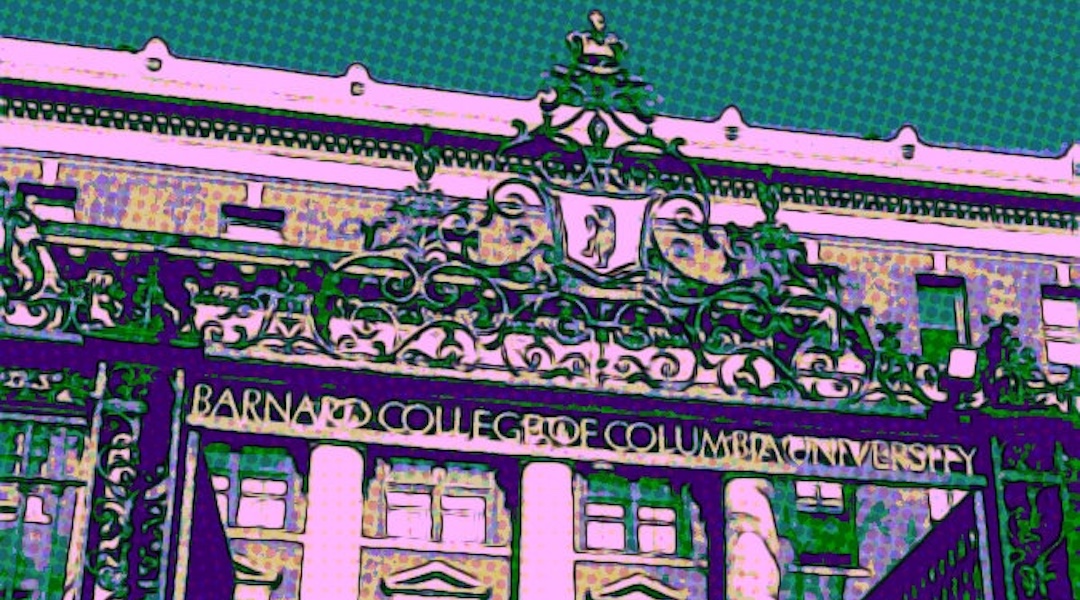This article was produced as part of JTA’s Teen Journalism Fellowship, a program that works with Jewish teens around the world to report on issues that affect their lives. For other perspectives on picking a college amidst the war in Gaza, go here.
(JTA) — It’s a Sunday evening at 7 p.m. and I am reviewing chemistry problems for my test the following morning. Even though my music is exceeding the dangerously high noise level, I hear my sister crying over the phone with my parents in another room.
My sister is a sophomore at Barnard College. These past two weeks she has called home a lot. Sometimes she tells us about the sign she saw of cartoon skunks with a star of David across their back, or the threat that read “Al-Qassam’s next targets,” or the police directions she had to follow on the way to class to avoid an angry mob.
But that night was different: She was scared. The encampment, the takeover of a campus building. It had all become too much.
The war in Gaza and subsequent protests has drastically dampened her school environment and cost her friendships. But above all, her peers’ unpredictability and unashamed antisemitism have threatened her safety. As a junior in high school who will soon be making college decisions, my sister’s experience makes me wonder if I could enjoy a school like Columbia University. I now have to consider where I will feel safe.
My parents raised my sister and me partially Christian and partially Jewish. We attended a Catholic elementary school and watched as all of our friends walked down the church aisle at their first communion. Though I decided to attend Hebrew school and get a bat mitzvah in middle school, my sister opted out.
Despite my sister’s complicated relationship with Judaism, her roommate stopped speaking to her after Oct. 7. My sister was hurt. Not knowing what she did wrong, she didn’t know how to solve the problem.
Since then, my sister only crosses paths with her roommate on social media or when she is on her way out the door. She sees pictures of her roommate online attending protests recognizable despite the mask she and other protesters wear to make them unidentifiable. Her roommate uses Instagram as a platform to share her thoughts on Israel and repost others’ pro-Palestinan slogans, all without having to speak to anyone’s face.
One day, after grocery shopping and unloading her food in the shared kitchen space, my sister was conflicted when she unpacked the matzah. She called my dad and asked if she should hide the matzah in her room where her roommates could not see it. He laughed at the absurdity of the question and said that that would be silly. So, my sister left it in the kitchen cupboard.
The next day as she rode the subway home, she opened Instagram to find a picture of her matzah on her roommate’s account. It read, “Opps [opponents] in the kitchen.” Outside logistical conversations, this was the first time her roommate had acknowledged her since Oct. 7.
When I tell my school friends in Saint Paul, Minnesota about my sister’s story, they anticipate a punchline that doesn’t come. I wait to see their jaws drop like mine did, but they still need to hear something worse. The charged slogans on signs, the threats, the unexplained ending of my sister’s friendships do not fit under their definition of antisemitism.
At my school graduates are required to give a capstone speech to the high school about something that each student finds important. The leader of the Jewish Student Affinity Club wanted everyone to know that he was not like the other radical Jews. He did not support this “genocide.” He did not believe in Zionism. He got a standing ovation.
I remember reviewing my sister’s college essay for Barnard. It addressed the heroic protests that our grandparents once took part in decades before when they attended Columbia and Barnard. It was my sister’s dream to go to this place where history is made. That was two years ago.
Since Oct. 7, it has become clear that Columbia University isn’t the same place where my grandparents thrived before — I am not sure it’s for our kind of people anymore. As the protests unfold, an institution’s response to recent antisemitism is a new guiding factor in my college decision.
JTA has documented Jewish history in real-time for over a century. Keep our journalism strong by joining us in supporting independent, award-winning reporting.







